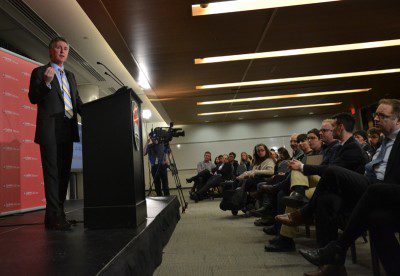When Kevin Donovan started at the Toronto Star as an intern, he thought he’d be there for five years.
[[{“fid”:”3962″,”view_mode”:”default”,”fields”:{“format”:”default”,”field_file_image_alt_text[und][0][value]”:””,”field_file_image_title_text[und][0][value]”:””},”type”:”media”,”link_text”:null,”attributes”:{“height”:”276″,”width”:”400″,”style”:”width: 300px; height: 207px; float: right; margin-left: 10px; margin-right: 10px;”,”class”:”media-element file-default”}}]]By Kelly Hobson
On a summer night in Scarborough in 1985, Kevin Donovan, then an intern with the Toronto Star, spoke to a woman recently widowed by a violent homicide. The widow told him the story of her husband’s life, occasionally reaching out to hold Donovan’s hand while she spoke.
“It was just a story, a very sad slice of life,” said Donovan, who dealt with a lot of deaths as a young reporter covering the crime beat in Toronto. “I wanted to make sure that whatever she said to me, that I did justice to it.”
He couldn’t have known it then, but Donovan would draw strength from that conversation for years to come.
“When I started at the Star, I thought I’d be there for five years,” said Donovan with a laugh.
Thirty years later, Donovan is one of Canada’s most prolific investigative reporters. He’s broken such stories as the ORNGE air ambulance saga and the Rob Ford scandal. His work on the Jian Ghomeshi allegations helped start a nationwide conversation about sexual assault.
On Mar. 12, Donovan delivered Carleton University’s annual Kesterton Lecture hosted by the School of Journalism.
“In your career, you’ll find one difficult adventure or experience will build on the next,” Donovan said to an audience of largely aspiring young journalists. “It’s harder to talk to the relative of someone who’s been murdered than it is to go into a battlefield.”
Unlike journalists who sound a death knell for the industry, Donovan is a cheerleader of students hoping to build a career out of telling stories.
“When you do get that tougher-than-tough assignment, you’ll find the experiences you have as a young reporter will be the building blocks you stand on as you build your career,” he said.
Donovan’s message to the students in the crowd was clear: there is a place for you in this ever-changing media landscape—you just have to find it. He offered up many lessons from his three decades of reporting.
Read books. Listen to music. Get involved in your community. These are the things that make great journalists, said Donovan.
His talk was highly anticipated by students at Carleton’s School of Journalism, according to administrators.
“I hope they do feel that same kind of passion for journalism and determination to do it,” said Susan Harada, associate director of Carleton’s School of Journalism. “It does take hard work day in, day out. It’s not always glamorous, but the stories matter.”
Donovan agrees. After the lecture, he added one final conclusion to a long list of musings developed over his career.
“You’ve got to get the story,” he said. “If you get a good story and you get it to the right people, they’ll publish it or they’ll air it. They really will.”

